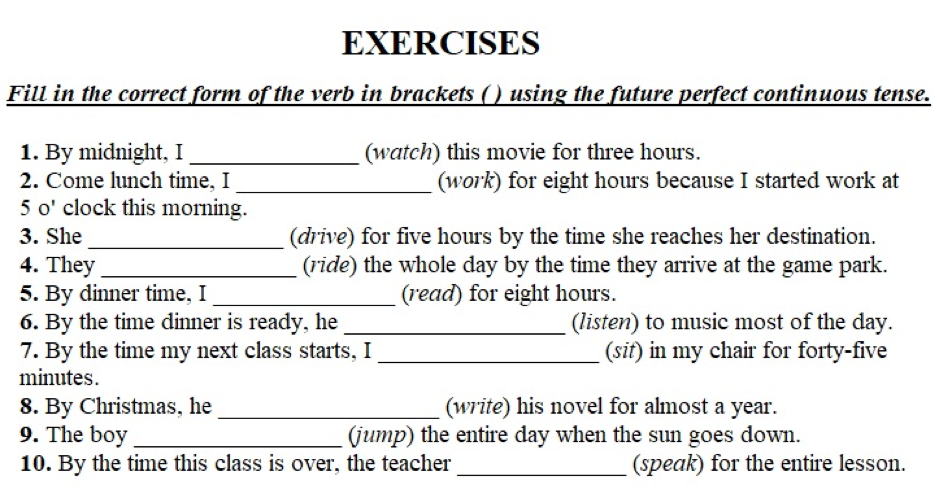When Do We Use Perfect Continuous Tense
Now, this is probably the most difficult tense to learn in English, and also the one that is least used, so we don't always have an opportunity to hear it being used in normal conversations.
Therefore, the question is ''When do we use the future perfect continuous tense?'', and I am going to try and explain its usage to you in this article by looking at how it works.
EQUATION
Firstly, the future perfect continuous tense has an equation, which is:
will + have been + verb-ing
An easy way to remember how many words to use in this tense can be as follows:
FUTURE:Will have
PERFECT: been
CONTINUOUS: waiting
"Will have been waiting"
Future is always represented with (will)
Perfect is always represented with the past participle (been)
Continuous is always represented with (ing) on the verb.
TIMELINE
Now that we understand the formula/equation for the verb tense, how is it represented on a timeline?
Let's look at my timeline below marked in RED:

As you can see, my timeline shows that the action is continuous from the present to the future.
Remember that the 'continuous' tense always refers to an ongoing action.
I am currently in the present, but with this tense, I am placing myself in the future to give an idea of how long the wait was (present to future) by saying (will) to show the future tense of the verb, so it could be (will have been waiting).
Let's understand this better by making a comparison between the present perfect continuous tense and the future perfect continuous tense.
If we place ourselves in the present and look to the past, the tense would simply be (have been waiting) without (will) as we are talking about from the (past until today) for the present perfect continuous tense as you can see below marked in BLUE:

Therefore, you can see that the only difference between the present perfect continuous tense and the future perfect continuous tense is merely adding (will) to the verb, because both tenses do the same thing, they just refer to different timeframes on the timeline.
WHEN TO USE THIS TENSE
Now, let's look at when to use future perfect continuous tense when speaking:
If I am sitting in the present in a 'waiting room' and it is 2 o'clock, and I have to wait until a certain time like 6 o'clock in the future, I will be waiting that entire time from now until the future time, so I will say (I will have been waiting 4 hours), and we add (by 6 o'clock) to give the end time in the future for your wait, so the sentence would read:
I will have been waiting 4 hours by 6 o'clock.
However, you might ask me "Why don't we simply use the future perfect tense (will have waited) instead of the future perfect continuous tense?".
Both tenses can be used to give the time that has lapsed for the future, right? Yes, either tense can be used to give the same time frame, but if you want to refer to the continuous action of 'waiting', then we use the continuous tense, and if you just want to give the time it took overall, then you say 'waited'. That is the main difference between these two tenses, and that is mainly why we don't hear the future perfect continuous tense so often, because we commonly use the future perfect tense in its place.
I will have waited 4 hours by 6 o'clock.
To sum up, we use the future perfect continuous tense to talk about the amount of time something took that was ongoing from the present until the future. We can replace this tense with the future perfect tense to give the same amount of time, but we are then giving the overall time it took and not emphasizing the continuous action like (waiting) that took place.
Why don't you have a go with some of my exercises below to practice using the future perfect continuous tense:

Answers below.

Source: https://www.speakenglishonline.com/blog/future-perfect-continuous-tense
0 Response to "When Do We Use Perfect Continuous Tense"
Publicar un comentario